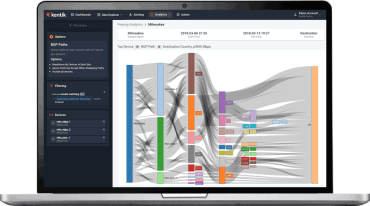
In the news this week: AI for high-dimensional data, AI-based health screening solutions to help businesses get back to work, and more.
Keeping pace with news and developments in the real-time analytics market can be a daunting task. We want to help by providing a summary of some of the items our staff came across each week. Here is a short list of some news from this week:
Fujitsu Laboratories, Ltd. has developed AI technology that accurately captures essential features, including the distribution and probability of high-dimensional data to improve the accuracy of AI detection and judgment. High-dimensional data, which includes communications networks access data, types of medical data, and images, remain difficult to process due to its complexity, making it a challenge to obtain the characteristics of the target data. Until now, this made it necessary to use techniques to reduce the dimensions of the input data using deep learning, at times causing the AI to make incorrect judgments. Additionally, the technology accurately captures the characteristics of high-dimensional data without labeled training data. Fujitsu tested the new technology against benchmarks for detecting data abnormalities in different fields, including communication access data distributed by the International Society for Data Mining “Knowledge Discovery and Data Mining (KDD),” thyroid gland numerical data and arrhythmia data distributed by the University of California, Irvine. The newly developed technology successfully achieved the world’s highest accuracy in all data, with up to a 37% improvement over conventional deep-learning-based error rates. Since this technology solves one of the fundamental challenges in the field of AI, which is how to accurately capture the characteristics of data, it is expected to prove an important development to unlocking a wide range of new applications.
Verizon Business and IBM announced they are entering into a collaboration to work together on 5G and edge computing innovation to help enable the future of Industry 4.0. The companies plan to collaborate on solutions combining the high speed and low latency of Verizon’s 5G and Multi-access Edge Compute (MEC) capabilities, IoT devices and sensors at the edge, and IBM’s expertise in AI, hybrid multicloud, edge computing, asset management, and connected operations. The two companies plan to leverage Verizon’s wireless networks, including Verizon’s 5G Ultra-Wideband (UWB) network, and Multi-access Edge Computing (MEC) capabilities, alongside Verizon’s ThingSpace IoT Platform and Critical Asset Sensor solution (CAS). These will be jointly offered with IBM’s market-leading Maximo Monitor with IBM Watson and advanced analytics. The combined solutions could help clients detect, locate, diagnose, and respond to system anomalies, monitor asset health, and help predict failures in near real-time.
Nuvoola Inc. announced the launch of a new health screening business solution aimed at helping companies limit the spread of the novel coronavirus in the workplace. The solution includes a touchless kiosk and a web-based questionnaire that leverages its flagship artificial intelligence platform. The solution is called LUKE AI for Health Screening and Protection (HSP), and it includes an app that employees use to assess their health status before arriving at work, in addition to an onsite, touchless kiosk that rapidly screens people for symptoms of COVID-19 as they enter buildings. The kiosk recognizes people by their employee card or by facial comparison and uses an automated process to greet and screen visitors using natural language interactions in French or English, based on their preference. At the same time, the AI-powered kiosk can verify whether a face mask is required, and measure body temperature using Teledyne DALSA’s Calibir infrared camera.
TigerGraph launched TigerGraph Cloud on Microsoft Azure. TigerGraph Cloud is a distributed native graph database-as-a-service that helps enterprises harness the power of the graph. With it, companies can quickly and easily build and run applications that work with highly connected and complex datasets. The company recently announced TigerGraph 3.0, which makes no-code advanced graph analytics easy while delivering core platform capabilities. TigerGraph Cloud allows teams to use the cloud vendor of their choice, offering support for Amazon Web Services (AWS) and now, Microsoft Azure.
Guavus announced the launch of Guavus-IQ — a comprehensive product portfolio that provides a unique multi-perspective analytics experience for network and communication service providers (CSPs). Guavus-IQ delivers highly instrumented analytics insights to CSPs on how each subscriber is experiencing their network and services (bringing the outside perspective in) and how their network is impacting their subscribers (understanding how their internal operations are impacting their customers). This single, real-time “outside-in/inside-out” perspective helps operators identify subscriber behavioral patterns and better understand their operational environments. This enables them to increase revenue opportunities through data monetization and improved customer experience (CX), as well as reduce costs through automated, closed-loop actions. In addition, Guavus-IQ has been designed to be ‘operator-friendly’ for CSPs — it doesn’t require the operator to be a data science specialist or expert. It combines network and data science and leverages explainable AI to deliver easy-to-understand analytics insights to CSP users across the business.
Hazelcast announced the latest release of Hazelcast Jet, which includes new application development features to its stream processing architecture. This new release enables existing infrastructure to gracefully extend to an event-driven architecture, enabling new functionality with real-time and in-memory processing. To reduce the effort required by developers, Hazelcast Jet now supports streaming integration with MySQL and PostgreSQL databases using a unified high-level API. Previously, traditional RDBMS-based applications required hundreds or thousands of lines of code to add functionality to existing applications and significant testing effort. With the new API, the integration becomes more of a declarative task to reduce the custom error-prone code. Additionally, Hazelcast Jet makes the database available as a stream. It deals with connectivity, object mapping, and unifies the event handling across database vendors. The series of database updates from an event stream on which developers can more easily add microservices without impacting existing applications. This simplification lets developers focus on adding new business logic in high-performance applications rather than managing complex and error-prone integrations.
Ascent and IBM announced a partnership to integrate their respective RegTech solutions in an effort to help banks and other financial institutions better manage their growing and ever-changing regulatory requirements. Specifically, IBM is integrating the Ascent branded regulatory knowledge platform from Ascent into its IBM OpenPages with Watson solution, to help clients leverage Ascent’s automatically-generated register of regulation and rule changes that pertain specifically to the customer. The integrated solution is designed to help regulated businesses keep better pace with today’s rapidly changing regulatory environment and help lower risk for potential fines and other supervisory actions. In addition, customers can benefit from the combined dynamic workflow capabilities and near real-time market intelligence by reducing the manual effort and time spent in transferring regulatory information between teams and disparate systems.
Iguazio announced a strategic partnership with SFL Scientific. The partnership will enable both companies to extend their offerings to enterprises of all industries looking to apply AI to real-life applications, regardless of the size or skill set of their internal teams. With the new partnership, SFL Scientific will offer data strategy and support for algorithm development across data centers and cloud infrastructures, while Iguazio provides its data science platform, which saves time and cost on getting AI to production.
FICO released a new report from the market intelligence firm Corinium that found the demand for artificial intelligence (AI), data, and digital tools is soaring as the COVID-19 pandemic continues to put a strain on many enterprises. Conducted by Corinium and sponsored by FICO, the report – Building AI-Driven Enterprises in a Disrupted Environment – surveyed more than 100 C-level analytic and data executives and conducted in-depth interviews to understand how organizations are developing and deploying AI capabilities. The study found that the uncertainties caused by the pandemic have forced many organizations to adopt a more committed, disciplined approach to becoming an AI-driven enterprise, with more than half (57 percent) of the chief data and analytics officers saying that COVID-19 has increased demand for AI, digital products and tools.
dotData announced the release of dotData Enterprise Version 2.0, with significant updates and new features that completely change the AI/ML experience for citizen data scientists and deliver greater performance and transparency. In addition to full UX remodeling of its interface, additional key updates that deliver superior AI/ML experience include auto-balancing of accuracy and transparency, more accurate and interpretable auto-designed features, expanded out of the box connectivities, and seamless model porting with dotDataPy and dotData Stream.
Yugabyte announced the general availability of YugabyteDB 2.2, the latest version of its high-performance distributed relational database, with new features designed to simplify enterprise database deployments and day-to-day administration. With this release, YugabyteDB now supports fully-transactional distributed backups, as well as online index, builds, deferred constraints, colocated tables, and more. YugabyteDB remains an open-source, distributed SQL database that can provide the scale and speed developers need to deploy global, cloud-native business-critical applications.
Stradigi AI unveiled a new self-service version of its Machine Learning (ML) cloud SaaS platform, Kepler. Stradigi AI lets users with no previous ML and Deep Learning experience reap the benefits of business-driving AI in hundreds of real-world applications. The Kepler platform provides end-to-end automation of complex data science processes with its new Automated Data Science Workflows. The automation features allow businesses to get AI projects to market quickly, solving common use cases in the market today, including customer segmentation, churn prediction, demand forecasting, predictive maintenance, sentiment analysis, attribution modeling, workforce planning, pricing optimization, and more.
If your company has real-time analytics news, send your announcements to ssalamone@rtinsights.com.
In case you missed it, here are our most recent previous weekly real-time analytics news roundups:






























